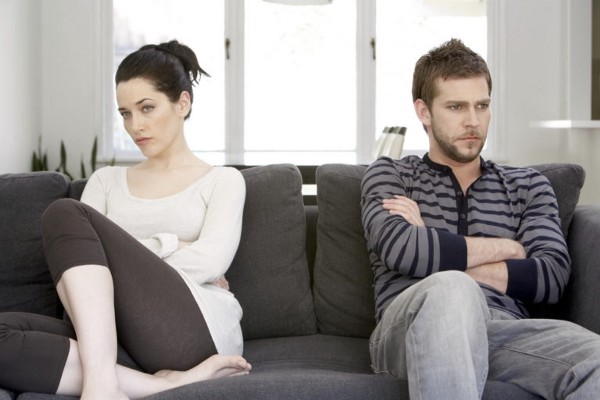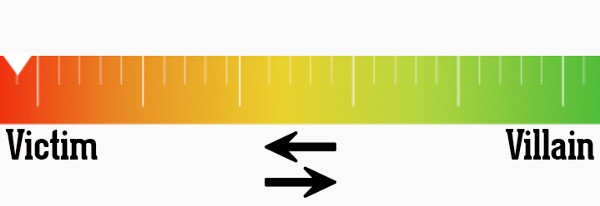Photo Credit: Sanketh Rao via Pexels.com
Writer’s Note #1: I originally learned these terms and concepts in 2002. Credit goes to Victor
Writer’s Note #2: There are many experiences in life where these terms do
“You’re a victim” I say neutrally to my client.
She squirms uncomfortably with both a pained look on her face and defiance in her eyes.
“Oh, you’re being the villain!” I say joyfully to another client.
His eyes flare with a lack of recognition. His face says “Who me? Um, I’m a nice guy, you’re c-r-
For every situation in our lives, we have the opportunity to take anywhere from 0% responsibility
Imagine Batman without the Joker. He would be driving around Gotham in the
We have biases in our society about responsibility. We are taught from an early age to Be Responsible and that victims are weak. We have thousands of hours of media influence telling us to “buck up, no pain — no gain, and that the early bird gets the worm”. At the same time, we have our own initial resistance that slows us down, keeps us in our beds when the alarm clock goes
In theory, we want to be responsible but in reality, we tend to run from it.
When I was in high school, I worked
In retrospect, I could have picked up the bike the first time I noticed it and walked into the office to apologize. Perhaps I would have needed to give him $20 or $30 to replace the mirror and my conscious would have been clear. Instead, 30 years later, I still remember the incident.
We do this constantly in relationships. When our partner makes an accusation, more often than not, we try to cover for our mistakes.
“Uh no, I wasn’t looking at her, no, never”
“No, I did pay the power bill. The check must have gotten lost in the mail”
“I didn’t hurt your feelings on purpose! No, I’m not feeling passive-aggressive. That must be you”
When I was very young, my mom caught me eating a stolen cookie from a supermarket. She grabbed my arm and brought me
There is some part of us, a young part I expect, that needs to protect ourselves. My teacher Vic Baranco also said that people tend to lie for two reasons: (A) to avoid punishment or (B) to look good. The problem with lying with people you want to be close to is that it creates a chasm between you and them. The second you lie and they buy it the intimacy between you decreases and your relationship slips toward mediocrity.
I teach couples to be responsible on both sides of every situation. In my work, I point out to each person how they co-created the situation and can take their share of the blame. Responsibility is not like a pizza pie where one person takes 7 slices and the other the remaining piece. No. Both people can claim 100% responsibility for everything that happens.

For example, I was recently coaching a couple where the woman had a sexual experience with another man. The man was pissed, betrayed, and very angry. In the societal view of this occurrence, the woman was “bad” and the man was the “victim” of the situation. The woman not only had to face her own shame about the actions but the anger of her partner.
I offered a different viewpoint to them. Through questions, I gathered that the woman had been talking about her desire, wanting more than their monogamy, and asking for more sensation in their lives for a period before the affair. She dropped hints, spoke openly, and prodded to his deaf ears. His refusal to listen, to take in her concerns and desires, was a big contributing factor to the infidelity. His non-confrontation created the chasm and in the end, she broke their agreement.

I invited the man to move from victim to villain. We broke down their relationship dynamics to the point where he could see his part in the situation. I watched as his face brightened and he started to feel empowered again. Where felt weak before, he started to feel his strength and true power again. Was there a more optimal way for her to behave? Of course. Was she solely to blame? Not in my world.
Each of us in every moment has the same opportunity to reframe our experiences and move from victim to villain. We can see how our actions or non-confrontation created the situation where the drama occurred. We can pinpoint the truth we didn’t say, the love we withheld, or the smile we felt too stingy to offer. We always have the choice. There are times when it’s fun to play the victim and let go of all responsibility. It is advantageous to let another person lead or run the show. However, it’s wise to do this deliberately rather than by default.
My client and his wife are doing better. I see their communication improve as they create more space for each other to be more of themselves. It took just one session for him to move away from that dire, martyred place of victimhood.
Being a victim is safe and familiar. You tend to get attention and it allows you to stay in this easy status quo. It allows you to not effort, not go to the gym, not change your diet or remain in a toxic relationship. You’ll have to let go of the BENEFIT of being a victim. The cost might be your health, your financial well-being or even your life. However, most people want to stay in the small, comfortable box because we know it so well. Your first step is to change your awareness that there is an issue. The second is commitment. The third is action. The last is perseverance. The results are typically hidden from us when we start but for me, and hopefully for you, living in your authentic desire is worth it to dig deep and discover the liberating truth
My hope is you take the first step. Let me know how it goes.

To hear more of Robert’s rants via his weekly podcast, please visit his website at RobertKandell.com. He also




![[Fierce Honesty] How To Boldly Transform Your Relationships & Your Life](https://robertkandell.com/wp-content/uploads/2018/05/8a.jpeg)